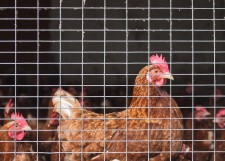
Credit: Shutterstock
US Right To Know (USRTK) a corporate-funded advocacy group was founded on the idea that the parts of the food industry not paying them has a lot to hide. USRTK says its mission is to educate the public about organic food and get labels on products that use what they consider to be dangerous practices. For them this generally means the labeling of genetically modified foods.
Scientists know that GMOs are as safe as their organic counterparts (better in some cases), but it's never wrong to argue that consumers deserve to know the process that goes making of their food. However, the execution of this sentiment has often been exploited, and has led to more consumer confusion than clarity.
One example of this is the "cage-free" label that now appears on eggs. It is currently so popular that many restaurants are moving exclusively to using foods labeled as such. Due to that popularity, Taco Bell has announced that they are doing the same, and beating McDonalds, Chick-fil-A and Subway to making the switch.
But what does it actually mean? To many people "cage-free" conjures images of happy, wild chickens that just happen to also lay eggs as they run around outside, interacting with other chickens. It also connotes "cruelty-free" in contrast to other chickens, but a more discerning look at what qualifies as "cage-free" quickly dispels this notion.
According to the the Humane Society of the United States, these hens actually don't have access to the outdoors. Furthermore, none of the listed designations for poultry protect the chicken against several harsh practices such as the cutting of beaks and starvation. Many are also killed far younger than their natural lifespan.

Credit: the Humane Society of the United States
Looking at this chart it is easy to see that the cage-free label or the organic label for that matter only serves to confuse consumers into thinking they are paying more and buying a product more ethical than everyone else. But cage-free is really just a microcosm of how many of these food labels natural, organic, shade grown, etc. don't inform anyone about anything important.
Natural does not mean healthier or better for the environment. Nor does organic. Organic food companies don't want real labeling because it would reveal their pesticide use and their far greater strain on the environment. The most commonly used organic pesticides are more dangerous than the most common synthetic ones and due to that organic farming techniques can be far more toxic to the environment than conventional ones.
This is the main problem with placing labels on food: If consumers don't know what the label means - or what it leaves out, like pesticide use - their right to know is still obstructed. In the same way that cage-free says nothing about the treatment of the animal, a label for genetically modified foods won't tell consumers anything about the quality of the product or the way it was produced.


